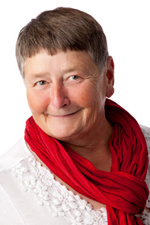Editor’s note: As part of the 2013 Live Healthy Iowa 10-Week Wellness Challenge, which runs Jan. 28 through April 5, Live Healthy Iowa has selected the second annual Dream Team. Members of the team will share their struggles, strategies, and successes throughout the challenge and exemplify the benefits of living a healthy lifestyle.
Jennifer Long, a University of Iowa Heart and Vascular Center employee and heart disease survivor, is part of the Dream Team roster. The story below recounts her health challenges and subsequent lifestyle changes.

Jennifer Long grew up on a farm in Mount Pleasant, Iowa. She lived an active life from a young age, doing farm chores and getting plenty of fresh air.
“I pretty much never paid attention to my health at all,” she says. “Doctors weren’t in my vocabulary. I was brought up that way. You go out and get fresh air and you feel better. And you don’t go to the doctor unless you’re really sick.”
Over the years, various things happened to Long that, with hindsight, seem like warning signs. Both her paternal grandparents died of heart attacks. In fact, her grandmother had a heart attack at a family funeral.
“That was before CPR,” Long says. “That was really my first experience with death within the family—to be right there and watch it. I would have been about 16.”
Long experienced high blood pressure during her pregnancy—a condition known as preeclampsia—but once her son was born, she didn’t think too much more about it. She was busy with a young son, a full-time job as a nurse, and tending to other relatives, including both her parents.
About 15 years ago, Long started experiencing the sensation of her heart racing. Her heart rate would increase to about 150 to 160 for about 45 minutes at a time. It wasn’t until much later that this was diagnosed as atrial tachycardia and treated with an ablation, a procedure to address electrical problems in the heart that cause irregular heart rhythms.
So far more than 8,000 Iowans have committed to live a positive, healthier lifestyle by participating in the 2013 10-Week Wellness Challenge. There is still time to register! The challenge begins Monday, Jan. 28, so team up and register your team today.
Save $5 by visiting a local Hy-Vee or Hy-Vee.com to obtain a discount coupon. The coupon code must be entered at time of registration. There are 40,000 coupons available for redemption. When the maximum number is reached the discount will no longer be available. Only one coupon is needed per team.
Visit www.livehealthyiowa.org for more information.
There was a time, when her son was young, that Long put a lot of time into her health—walking and doing aerobics several times a week and eating healthy. But she couldn’t sustain it and eventually gained the weight she’d lost. Several years later, caring for her mother became a full-time job for Long in addition to her paid nursing job.
“There would’ve certainly not been much time there to live healthy—exercising and eating right—even if I’d thought about it,” she says.
After almost 60 years of what she calls “a pretty laissez faire approach” to her health, Long went to the dentist with a tooth problem.
“They wouldn’t touch my tooth until I had my blood pressure under control, and that was a wakeup call to lose weight, exercise, and change my diet,” she says.
Long’s lifestyle change was immediate and dramatic.
“I lost 70 pounds in the first year and a half, and built my exercise up to sometimes two or three hours a day, but routinely at least an hour. I started really watching sodium and all the fat products,” she says. “I drink at least 60 ounces of water a day, and I can’t have a can of pop until I’ve drank all the water.”
Long recognizes that 70 pounds is “a lot, and I’ve maintained it, so that’s huge,” she says.
She also acknowledges that losing weight isn’t easy. However, she has found that talking about it with other women is beneficial. In fact, she has shared her story with large groups, including an audience of more than 100 nurses.
“The impact was amazing,” she says. “I know I have to keep going. People always see me carrying my water. And people say ‘I saw you out exercising’ all the time.”
Jennifer walks with two sticks, which have come to be her signature.
“On vacation in Lake Okoboji, a woman I met while exercising asked me, ‘What good do those things do you?’ I said, ‘Well, I don’t have to walk as fast, and I get arm movement. I can get the same amount of exercise by not walking so fast but by moving the sticks. Plus, I can get abdominal crunches in too, because as I push back I’m actually crunching my abdominal muscles. It’s a good overall workout.”
Long understands firsthand that some women don’t talk about heart disease because they’re busy taking care of everybody else. Also, she notes a lack of awareness about how heart disease affects women.
Her advice is simple but direct:
“Women should make sure they’re heart healthy by visiting a physician and working on diet, exercise, and stress,” she says.